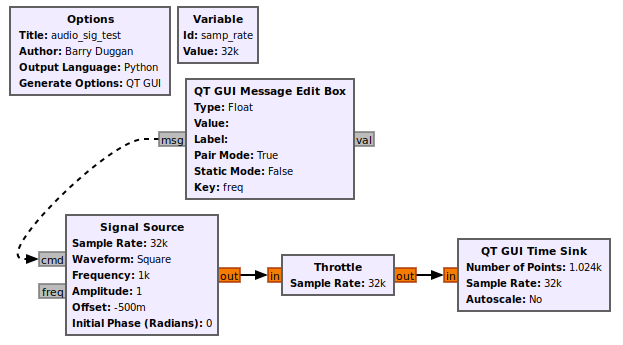Throttle: Difference between revisions
No edit summary |
No edit summary |
||
| Line 8: | Line 8: | ||
== Example Flowgraph == | == Example Flowgraph == | ||
In this example flowgraph, if you remove the Throttle block the output will look the same, but your CPU will be at 100% and GNU Radio might crash. | In this example flowgraph, if you remove the Throttle block, the output will look the same, but your CPU will be at 100% and GNU Radio might crash. | ||
[[File:signal-source-ex.png|700px]] | [[File:signal-source-ex.png|700px]] | ||
Revision as of 18:37, 14 May 2019
Throttle flow of samples such that the average rate does not exceed the specific rate (in samples per second).
A throttle block should be used if and only if your flowgraph includes no rate limiting block, which is typically hardware (e.g., an SDR, speaker, microphone). It is not intended nor effective at precisely controlling the rate of samples. That should be controlled by a source or sink tied to sample clock. E.g., a USRP or audio card.
The Throttle Block is typically attached directly to the output of a non-hardware source block (e.g. Signal Source), in order to limit the rate at which that source block creates samples.
Example Flowgraph
In this example flowgraph, if you remove the Throttle block, the output will look the same, but your CPU will be at 100% and GNU Radio might crash.
